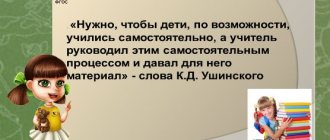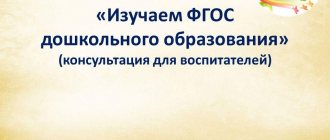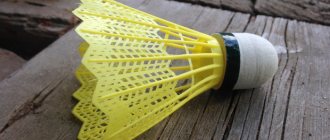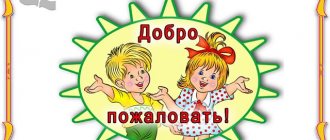Business game for teachers of preschool educational institutions “Creativity of Educators”
Author: Udalova Olga Vladimirovna
educational psychologist GBOU School No. 1383
Business game for teachers of preschool educational institutions “Creativity of Educators”
Summary of a business game for educators “Teacher Creativity”
Goal: Updating and developing the communicative and creative abilities of teachers, team building.
Objectives: Development of creativity, the ability to act quickly when solving non-standard problems. Development of group cohesion, development of communication skills.
Materials:
- a bag with chips for dividing into teams (for example, geometric shapes or Lego cubes of three or four types, depending on the desired number of teams);
- paper, colored pencils, pens;
- forms with proverbs.
Progress of the business game:
Good afternoon, dear colleagues!
Recently, creativity as a personality trait has begun to be actively studied in psychology. Experts are interested in why some people easily manage to solve problems in a non-standard way, while for others it is difficult to move away from stereotypes. What do you think is a creative person and how does he differ from a non-creative person?
In the course of a number of studies, psychologists have come to the conclusion that a creative person has a sufficient level of intelligence (the most optimal level of intelligence here is slightly above average), flexibility of thinking, and an orientation towards creativity as an internal driving force, thanks to which creativity manifests itself in all areas of life.
From a psychological point of view, a creative person is a person who thinks outside the box and knows how to see a problem from different angles.
Creativity is the leading component of pedagogical activity. The creative product of a creative teacher can be new educational technologies, forms, methods of teaching and education.
So, today I suggest you learn to look for non-standard ways out of standard situations, think creatively and thereby raise your professional level.
Organizing time:
Now we will divide into teams. To do this, each of you will choose one item from the bag. Teachers are invited to choose a subject and form teams.
In order for teachers to be known and appreciated for their professional qualities, teachers must be able to present themselves in some way.
Exercise “Announcement”
Within 3 minutes, each team must write a short statement about their services that reflects their professional uniqueness and includes something that another specialist cannot offer. This announcement is then read out to everyone. Other teams can ask any questions about the content of the ad in order to make sure that the service is really worth using.
Game "Staging"
A fairy tale is a powerful tool for the speech, cognitive, artistic and aesthetic development of a child. The fairy tale helps children understand what good and evil, courage and cowardice, mercy and cruelty, perseverance and cowardice are. Children easily recognize fairy tales by characters, passages, and illustrations. The facilitator offers the teams a more difficult task. One team needs to show a dramatization of some fairy tale using non-verbal means of communication (gestures, pantomime, facial expressions); others need to guess its name. Then the teams change places.
Such tasks develop creativity and imagination. Children become more free and liberated.
Game "proverbs and sayings"
In the speech development of children, a large place is given to proverbs and sayings. Proverbs and sayings have ample opportunities for developing a child’s conscious attitude to the semantic side of a word. Understanding and using proverbs and sayings presupposes mastering the figurative meaning of words and understanding the possibility of their application to various situations. It is in proverbs and sayings that there is enormous moral and aesthetic potential. They are not large in volume, but capacious in meaning. Using proverbs and sayings in their speech, children learn to express their thoughts and feelings clearly and eloquently.
“Translate” the proverbs into Russian.
1. The son of a leopard is also a leopard (Africa) - The apple doesn’t fall far from the tree
2.You can’t hide a camel under a bridge (Afghanistan) – You can’t hide an awl in a sack
3. Be afraid of a quiet river, not a noisy one (Greece) – In still waters there are devils
4.Silent mouth - golden mouth (Germany) - The word is silver - silence is golden
5. He who asks will not get lost (Ireland) – Language will take you to Kyiv
6. A scalded rooster runs away from the rain (France) – Burnt on milk, blows on the water
Exercise “Kind Palm”.
Participants are given pieces of paper.
The presenter invites participants to trace the outline of their palm and write their name on it, then pass the piece of paper with the outline of the palm to their colleagues. Each participant writes his wishes or compliment on one of the fingers of his palm. The message must have creative content, a personal appeal, and in any way mention the strengths of a particular person.
The final game is aimed at comprehending the experience gained during the meeting and summing up the results.




